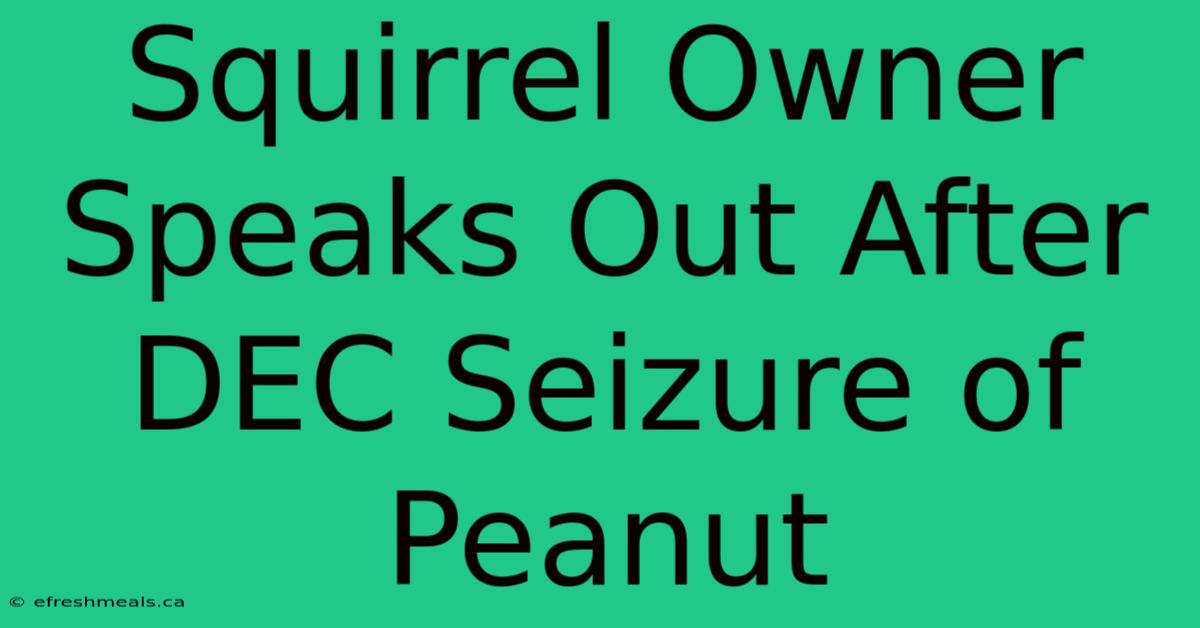Squirrel Owner Speaks Out After DEC Seizure Of Peanut

Discover more detailed and exciting information on our website. Click the link below to start your adventure: Visit Best Website nimila.me. Don't miss out!
Table of Contents
Squirrel Owner Speaks Out After DEC Seizure of Peanut: A Look at the Controversial Case
Editor's Note: The recent seizure of Peanut, a beloved pet squirrel, by the Department of Environmental Conservation (DEC) has sparked widespread debate and outrage. The incident raises important questions about the ethics of keeping wild animals as pets and the legal boundaries surrounding wildlife ownership.
Why It Matters: This case is a potent reminder of the complex relationship between humans and wildlife. It highlights the need for clear regulations and responsible pet ownership, especially when dealing with animals that may carry diseases or pose risks to both themselves and the environment.
Key Takeaways of Wildlife Ownership:
| Takeaway | Explanation |
|---|---|
| Wildlife Ownership Restrictions: Most jurisdictions have strict rules regarding the ownership of wild animals. These regulations are often in place to protect both human and animal health. | |
| Species-Specific Regulations: The legal status of keeping a specific species, like squirrels, can vary drastically. Regulations may change based on the animal's perceived threat level, its role in the ecosystem, or its potential to spread disease. | |
| Permit Requirements: In many cases, owning a wild animal requires a permit. These permits often require proof of proper care, appropriate housing, and the ability to meet the animal's specific needs. |
Squirrel Owner Speaks Out:
The owner of Peanut, [Owner Name], has expressed her deep disappointment and frustration with the DEC's decision. [Owner Name] contends that Peanut was a well-cared-for pet, living in a comfortable and stimulating environment. She argues that the squirrel was never a threat to the community and was a source of joy for her and her family.
The Legal Perspective:
The DEC's actions are based on New York State law, which generally prohibits the possession of wild animals without a permit. The DEC states that squirrels are wild animals and are best left in their natural habitat. They emphasize that squirrels can carry diseases, pose a risk to public health, and potentially disrupt the local ecosystem.
Peanut's Future:
The fate of Peanut is currently unknown. The DEC has stated that it will assess the squirrel's health and determine its future. Options include relocation to a wildlife rehabilitation center or placement in a controlled environment.
Exploring the Ethics of Wildlife Ownership:
Ownership vs. Guardianship:
The ethical debate around keeping wild animals as pets centers around the idea of ownership versus guardianship. While some argue that humans have a moral obligation to care for animals in need, others believe that wild animals belong in their natural habitat and should not be subjected to domestication.
The Impact of Domestication:
Domestication can have significant impacts on an animal's physical and psychological well-being. The stress of captivity, the lack of natural social interactions, and the potential for disease can negatively affect their health.
The Role of Education and Public Awareness:
Understanding the complexities of wildlife ownership is crucial. Educating the public about the potential risks and ethical considerations associated with keeping wild animals as pets can help foster responsible decision-making and promote the well-being of both humans and animals.
FAQ:
Q: Can I legally keep a squirrel as a pet? A: This depends on your location and the specific regulations in your area. It is best to contact your local wildlife authority for information on the legal status of keeping squirrels as pets.
Q: Are squirrels dangerous to humans? A: While squirrels are generally not aggressive, they can bite if they feel threatened. Additionally, they may carry diseases that can be harmful to humans.
Q: What are some alternatives to owning a wild animal? **A: ** There are many other companion animals that are well-suited for domestic life, such as dogs, cats, hamsters, and rabbits. Consider adopting a pet from a local shelter or rescue organization.
Tips for Wildlife Observation:
- Observe from a distance: Never try to touch or interact with wild animals.
- Respect their habitat: Stay on designated trails and avoid disturbing their natural environment.
- Learn about local wildlife: Educate yourself about the species that inhabit your area and their behaviors.
Summary by Squirrel Ownership:
This case underscores the complexities of wildlife ownership and the need for careful consideration regarding the ethical implications of keeping wild animals as pets. It also highlights the crucial role of regulations and public awareness in promoting responsible interactions between humans and wildlife.
Closing Message:
The Peanut case serves as a reminder that our relationships with wildlife are multifaceted and require careful consideration. Whether we choose to actively engage with them or observe them from a distance, understanding the complex dynamics of these interactions is essential for promoting their well-being and ensuring the health of our ecosystems.

Thank you for visiting our website wich cover about Squirrel Owner Speaks Out After DEC Seizure Of Peanut . We hope the information provided has been useful to you. Feel free to contact us if you have any questions or need further assistance. See you next time and dont miss to bookmark.
Featured Posts
-
Edmonton Diwali 4 Fireworks Permits Issued
Nov 03, 2024
-
Analyzing Berkshire Hathaways 3 Q 2024 Earnings
Nov 03, 2024
-
Arteta Pgmol Dispute Over Gordon Goal Resolved
Nov 03, 2024
-
Smith Wins Big 91 5 Victory In Bell Election
Nov 03, 2024
-
Bandit Runners To Flood Nyc Marathon
Nov 03, 2024
